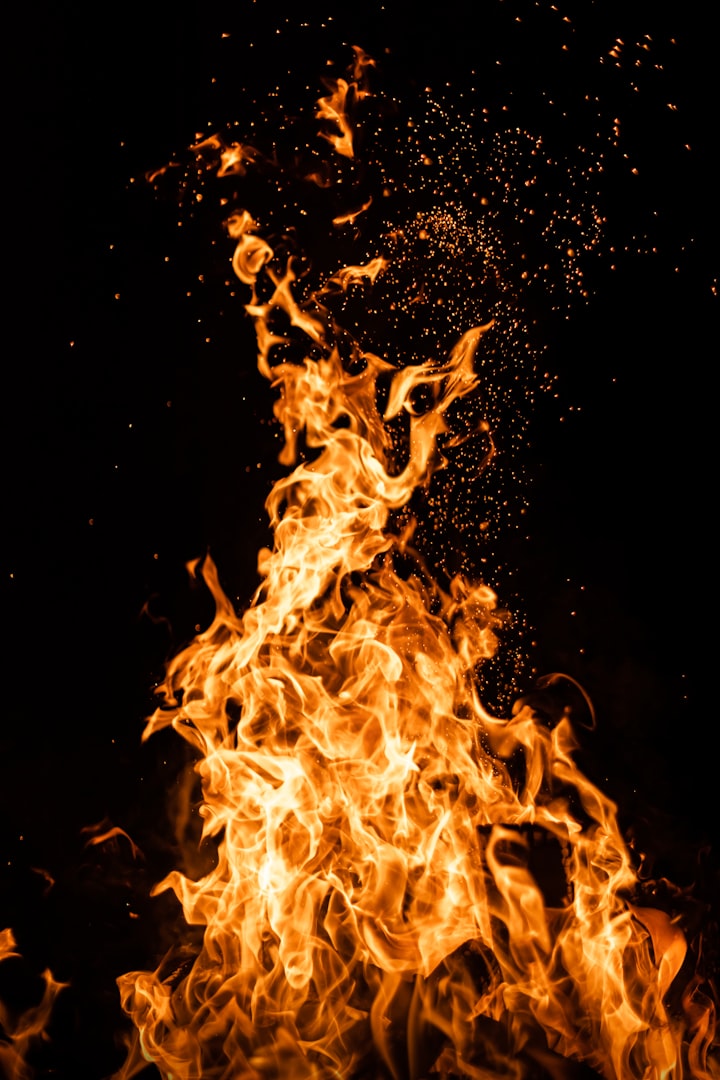Hellfire
"I'll come back for you," she said as the fire consumed her.

The cabin in the woods had been abandoned for years, but one night, a candle burned in the window. Standing in the town square, Reverend Needham looked at the distant, wavering glow, and terror gripped his heart. He steeled himself and said a silent prayer that his God, who had always guided him with a sure and steady hand, would once more give him strength, make him the instrument of his divine will. He would need to gather the others, the Elders whom he knew he could rely on. Righteousness would again prevail, he said to himself. It must.
Elsewhere, Verity Taylor had also seen the light. A cry had caught in her throat and remained there, choking her to tears. She stood transfixed, staring, willing the light to mean everything it once had meant, to take on a familiar human form and descend from the forest, solidify on her doorstep, and appear there, in the one-room house at her side. When a hand rested gently on her shoulder, she gasped and turned, shaking, to find only her father, felt hat in hand, mouth open, eyes reflecting the changing colors of the twilight sky. There was no question; he had seen it too.
"What can it mean?" asked Verity.
Josiah Taylor was squinting, looking for something more than the single, faint beam to show him that perhaps the world had been, at long last, put right again. But all he saw was darkening elms, and the thin sliver of a moon above.
"I don't know," said Josiah. He placed his hat on his head and went to fetch his cloak. "But I'll know soon enough."
"Father!" Verity cried as the heavy wooden door closed behind him. She watched through the thick-paned glass as Josiah's dark profile disappeared among the rows of low, thatched-roof houses. She considered for a moment what was right and proper for a girl of sixteen to do in a moment such as this. None of the answers that came to her were satisfactory. She sought out her warmest shawl, put out the lamps, and stole into the night.
Prudence Abbott watched her go from the house next door. She had been standing at the window since the candle appeared, contemplating her own journey up the hill. Her husband Isaac was still busy at the mill, and no one would notice her absence for some time, with the children now old enough to look after themselves. Nothing was stopping her, nothing but the anguish in her heart.
She remembered that night, so long ago now, when she had stumbled, face stained with tears, across the lane to the Taylor residence, and tapped on the glass the way she'd been told to do. Four times, quickly, then twice, spaced apart. The door had opened right away, and there was Mercy Taylor, her young girl in her arms, dark hair unpinned like a heathen, ushering her in. Josiah had brushed past her on his way out, as if to leave them to it--as if he had known that this was women's business.
It wasn't that she didn't want it--she loved children in general, and all six of her own particularly--it was just that she was old now, nearing forty, and she was afraid, you see. Her mother had died in childbed--number seven, was Prudence--and she was terrified the same would happen to her. She just didn't know if her body could take another.
Mercy had listened calmly, quietly, one hand over her own, while Verity played by the fire. Prudence had been struck by her clear, quiet eyes, her pacifying tone. She had felt immediately better in Mercy's presence, like everything would be alright. She also felt she'd never really seen her neighbor until now. In town, Mercy was all smiles and politeness, hair plaited and covered for modesty's sake. Here was another person entirely, a person she liked altogether better.
The tincture she gave her smelled of licorice and wood rot. Mercy had explained what it was made from, what roots were ground and herbs pressed to produce the vile liquid, but Prudence was too overwhelmed by the prospect of it all to remember the ingredients. All she remembered was that she was to meet Mercy at the small hut in the woods in one day's time--a candle in the window would be her guide.
Prudence shuddered now, seeing the ghostly light, there in the very same window. It could not bode well. She told her eldest to put the corn pudding on, and went out into the cool evening air.
At the starting of the hill path, she met Esther Kingsbury. Esther was startled to see someone, anyone, entering the woods at this hour, and as their eyes met she knew instantly that they were there for the very same reason. Prudence looked away as she said her good morrows, confirming Esther's suspicions. She felt herself in good company as they climbed the narrow dirt track.
When Esther had last taken this road, following the same light that now shone in the window, she had done so not with trepidation, but with surety in her step. Despite already feeling the effects of the tincture, she knew there had been no alternative. The man whom she had fallen for in her youthful naivete had since turned cruel and overbearing, and she knew that the growing seed in her belly would tie her to him for the rest of her days. She would not, could not, spend her life under his oppressive thumb. Mercy Taylor had offered her her only chance at freedom, and she had taken it, down to the last repulsive drop.
She remembered a feeling, a twinge of pain that had hastened her steps to the door of the small wooden structure nestled between the trees. Josiah Taylor had built it years ago, ostensibly as a hunting lodge of sorts, but really, Esther suspected, as a sanctum in which Mercy could work her magic undisturbed. For that's what it was, to Esther: magic. Mercy had a special power, the power to save Esther, and the others in the village, from a lifetime of nothing more than parturient servitude, sentenced to exist entirely at the whims of one's own fertility, by virtue of nothing more than being born a woman. Esther didn't know what lay ahead of her at the time--a late marriage to a kind man, twin boys on whom she doted completely--but she knew, with great conviction, that her life would be better because of Mercy.
And now she found herself emerging into the small clearing in front of the cabin and discovered what she had long known in her heart to be true--that she was not alone. For around the cabin were gathered three dozen or more women--nearly, it seemed to Esther, the whole of the female townsfolk that had come of age more than a decade ago, before Mercy was killed. All of them had been drawn by the light in the window, and had made the journey up the footpath for the second time.
Esther and Prudence milled about among them, exchanging quiet greetings, but not much more. It was clear why everyone was there, and clear that no one knew why the light had reappeared now, ten years later.
"To the day," said Josiah Taylor, overhearing their low conversations. Verity stood next to him, grown now, the spitting image of her mother before her, Prudence thought. "It was ten years ago today that--"
They all turned toward a murmur that had arisen on the far side of the crowd. A new face had appeared among them. A face none of them could ever forget.
Rebecca Needham, once the most beautiful of them all--everyone agreed--was now a hollow shell of herself. She had been so rarely seen in the last ten years that the women had almost forgotten her much-lauded golden locks and the fresh flush of her cheek. But the unkempt salt and pepper hair and the sallow complexion of this version of Rebecca did no justice to her less than thirty years. Her dress looked hastily worn, with its buttons awry, and her head covering was askew. She seemed not to see any of them as she walked into the center of the crowd, which parted as she came, and stood face to face with the light in the window.
Verity had spent much of her youth hating Rebecca Needham, building and mythologizing Rebecca's role in her mother's death all the more for her absence from public life. It is always easier to hate that which we cannot see, her father often said. But now that she was nearly as old as Rebecca had been when everything happened, she had begun to soften to her; seeing her in the flesh, she felt nothing but pity. Rebecca was as much the victim as her mother had been, and though she had not paid with her life, the cost had clearly been almost as great.
Verity was only six when Rebecca accused her mother of witchcraft. She remembered that time of her life in glimpses: her mother holding her tight before walking toward the courthouse, head held high; her father crying for the first time in her life, a flood of tears that for a long time seemed endless; men staring at her with fire in their eyes; women, with sorrow. The reality of the matter was only learned through time, retellings she collected like souvenirs, as she slowly pieced together the truth of her mother's death.
Rebecca, a young bride at seventeen, had fallen pregnant shortly after marriage to the Reverend Needham, the township's fiery, outspoken minister and de facto leader. Her new husband, a jealous, controlling man, had confined her to her room when he heard she had been seen unaccompanied in the village the day before. Tragically, Rebecca's confinement coincided with her appointment at the cabin in the woods, and the bloody scene that Reverend Needham had found on returning home had immediately put him in mind of sorcery. It didn't take much to discover the connection to Mercy Taylor, and accusations and a trial soon followed.
At trial, Verity heard, Rebecca had been inconsolable. She could hardly speak most of the time, and only responded to questions by subtle nods, staring all the while at her domineering husband. It was clear to everyone in attendance that her responses were not her own.
Everyone had a different account of what it had been like to watch the carrying out of Mercy's sentence. Some said the flames had turned white and they had seen Mercy carried up to heaven. Others said Mercy had cursed the whole town before she was consumed by the fire. Verity saw her father as her only truly reliable source, although she could hardly believe even his account. That she had told him to look after Verity, she knew to be entirely plausible. But it was the rest that seemed questionable at best.
"I'll come back for you," Mercy had said, loud enough for all to hear. The words had been directed at Rebecca Needham.
I'll come back for you. The phrase had always rattled in Verity's head, heavy and awkward. It didn't belong. From all her memories, and all accounts, her mother wasn't a vengeful woman--though Verity didn't know what it must do to a person to be burned at the stake. She wanted to give her mother the benefit of the doubt, believe that it was the agony of the moment that had driven her to such talk, such ire against a woman who was clearly not responsible for her actions.
But here they all were, Rebecca included, gathered around a candle in the window, ten years to the day since her mother's murder. Could it be true?
"Let's go in, Father," said Verity urgently. She had to know what came next.
Josiah looked down at her, a strange expression on his face. "I've been trying. I can't go any further."
Verity tried to step forward, but found that her legs didn't work. She stepped backward with ease, and could even sidestep without issue; but she couldn't move any closer to the cabin. She looked at Josiah questioningly.
"I don't think it's us she wants," said Josiah.
Before he could explain himself further, there arose a hubbub from the hillside below, and the Reverend himself and a group of four elders crested the hill, armed to the teeth and carrying torches. The women had lived in fear of this man and his cronies for so long that they backed away instinctively to make room for them. But something was bubbling underneath the surface; you could see it in their faces. Disgust was fast overtaking the fear, and it was about to boil over.
Needham instantly bristled at the crowd of townswomen standing in his way. He should have been more expansive with his doling out of discipline after the incident with Rebecca. He had heard talk that she wasn't the only one who had employed the witch's services. Perhaps he should have cast a wider net, reined in the more unruly among them, he thought sourly. A few more burnings would have had a more enduring impact.
"My good women, if you will kindly let us pass--" he began, pushing his way through the group. But suddenly he was stopped dead in his tracks, his face turning an unappealing purple as he came face to face with his own wife among them. His mouth dropped open as he searched for the words. Rebecca simply stared ahead at the candle blankly.
His rage at his wife for all of it--for denying him in the first place, for destroying the fruit of his loins thereafter, for shutting herself away from him ever since--all of his anger had morphed and changed over the years into mortification. While others had obedient, fruitful wives, he, a man of God--God's right hand in this village, truly--had been saddled with a cold, barren woman whose mind had gone years ago. He understood that God sent tests to fortify him against the evils of this world, but he felt the eyes of the town upon him and sometimes, privately, cursed his misfortune.
But now that she had ventured forth toward the light, in front of so many townsfolk, his own Elders, even--this was too much to bear. The rage seethed within him once more and he swore to himself he would have her head. She was in league with this long-dead sorceress--that much was now clear. He would start proceedings the very next day.
But now there were more important things to attend to. Needham composed himself, smoothing down his long hair and straightening his ruff. He was about to put an end to this nonsense once and for all.
"Good people," he announced. "I have seen your suffering at the hands of this blasphemous witch before. I thought I had meted out God's judgement. But now I see that God was not done testing us. I have come to deliver you once more, and this time, with finality."
Instead of cheers, he was met only with spiteful glares. Oblivious, he continued.
"Tonight, I--"
"Murderer!" shouted Josiah Taylor.
Silence fell. Needham was too astonished to react.
"Hypocrite!" cried a female voice.
"Sinner!" hissed another.
Shocked, Needham backed away, but found himself surrounded. There was suddenly a small hand on his back, and he was thrust heavily onto the ground. Facing down, his mouth full of dirt, he felt a rounded leather toe at his ribs, and another digging into his kidneys. Instinct rather than experience told him he must get back up, for these people--his own flock, whom he had shepherded so graciously for so long--were out for blood.
He pushed himself off of the ground and half-ran, half-crawled toward the shack. His men, experiencing similar treatment at the hands of the mob, stumbled too toward the door. They rushed inside and locked the door behind them. As soon as the latch fell, the candle went out.
What happened next is the subject of some lore. Some say it was the men's own torches that set the house alight; others claim that they saw Mercy Taylor herself smiling among the flames. But all can agree that the structure was burned to ashes within minutes, and all the men inside with it. The Taylor family and the women outside watched from a safe distance as judgement, divine or otherwise, was finally dispensed.
Slowly, one by one, the women turned away and began the journey home. Josiah and Verity remained, looking down at the smoking foundations as if watching the end of a funeral long denied. Josiah squeezed Verity's shoulder as the last embers began to die and, in the distance, the first light of day appeared. As they turned to leave, they were surprised to find Rebecca Needham still there, kneeling in front of the ruins, cradling her tear-stained face in her hands.
Verity approached slowly and knelt in front of her, offering her hand.
"Are you alright, Miss Needham?"
Rebecca looked up at her, smiling through her tears.
"She came back," she whispered. "She came back. For me."







Comments
There are no comments for this story
Be the first to respond and start the conversation.